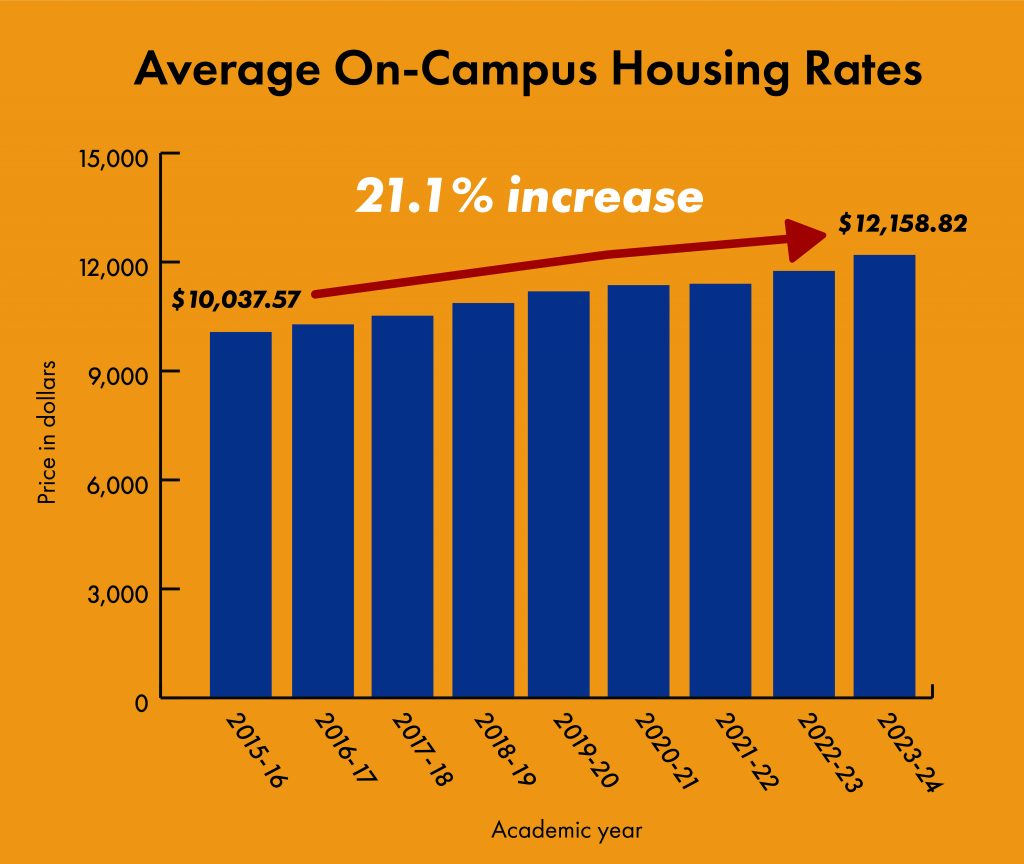
Binghamton University is planning to raise on-campus housing rates for the 2023-2024 academic year.
The proposed prices represent a 3.8 percent aggregate increase, or about $440 over the academic year. Residential Life, which aims to support learning and growth by “[providing] a small school residential experience within a premier public University,” has — in conjunction with BU administration — raised the cost to live in dormitories and on-campus apartment complexes by about 21 percent from 2015 — the oldest year with available public figures. The increase from a cross-campus average of $11,717 to $12,159 is the largest jump in recent history.
Paola Mignone, Ph.D. ‘21, the assistant vice president for residential experiences and auxiliaries, explained the annual process behind deciding the new rates.
“The process involves representatives from a committee consisting of administrative areas involved in operating the residence halls meeting with students from the residential community governments,” Mignone wrote in an email. “Factors that influence rate increases include construction costs for annual repairs and renovations, utilities, furniture replacement, salaries and fringe [benefits] for University staff.”
Mignone further described student housing capacity as “at essentially 100 percent,” and explained that a waiting list is typically needed for returning students. She confirmed that the total cost of University-managed housing is included in the cost of attendance figure, which is used to determine financial aid awards.
Eliana Sastow, a senior majoring in psychology, expressed a belief that housing access should be equitable, regardless of profits.
“Housing is an integral part of campus life,” Sastow said. “It’s a way to make friends and feel comfortable at the University. It should be an equal right for everyone, no matter their socioeconomic status.”
According to the University’s cost of attendance estimator, both in- and out-of-state students are paying over 16 percent more than six years ago to attend BU.
In addition, students living on lower campus — College-in-the-Woods (CIW), the Dickinson Community, Mountainview College, Newing College and Hinman College — must purchase a resident meal plan from BU Dining Services (BUDS). Currently, Meal Plan C, the default option, costs $5,900 per academic year — $1,900 of which is allotted to students as dining dollars, while the remaining $4,000 goes toward “membership fees.” According to BUDS, membership fees cover non-food costs incurred in the operation of dining halls, including labor, supplies, utilities and maintenance.
The proposed administrative changes mirror the national trend of increasing college costs. According to a report published by the Minneapolis branch of the Federal Reserve, sticker prices at public institutions have risen more rapidly than their private counterparts since 1990. The central bank further stated that price increases were the result of rising economic inequality — leading to a “cascading series of effects,” including some lower and middle-class families opting out of higher education.
Matthias Cho, a junior majoring in business administration, discussed how rising costs on campus informed his housing decision for the next academic year.
“When deciding where to live next year and looking at the rates between U Club [Binghamton] and Hillside, I saw that they were similarly priced,” Cho said. “I chose U Club because it is around the same price for a much better place.”
Joshua Kim, a first-year graduate student pursuing a master’s degree in accounting, described his experience in the apartments community.
“Building-wise, I think it needs a little updating,” Kim said. “I think it would be great if [Residential Life] renovated the buildings, [as] they’re a little old and a bit dirty. It would be nice to have air conditioning.”


